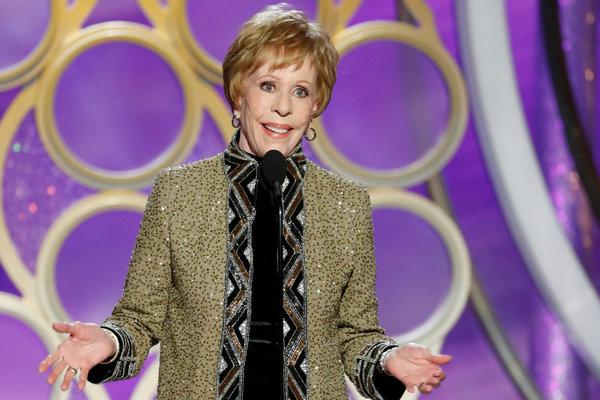The 2019 Golden Globes didn’t want any trouble.
The previous two years, the usually bubbly event found itself responding to upheavals in politics and in the power structure of Hollywood. This year a big issue hanging over the awards ceremony was another awards ceremony: the Oscars, which is still without a host after a search that included the naming and quick unnaming of Kevin Hart, after objections to the comedian’s history of homophobic jokes.
The hosts, Sandra Oh and Andy Samberg, kicked off their opening monologue declaring that they were “the only two people left in Hollywood who haven’t gotten in trouble for saying something offensive” and announcing that one lucky audience member “Will! Host! The Oscars!”
[Read our analysis from the Golden Globes ceremony | Browse the list of winners]
Their opener, amiable if a little stiff, played on the idea of aggressive niceness, “roasting” stars in the room with compliments. Even one of the zingers, a joke by Oh about Hollywood’s casting white actors as Asian characters, produced a cheerfully penitent “I’m sorry!” from Emma Stone, who played a part-Asian character in “Aloha.”

Carol Burnett was the first recipient of an award named after her, for achievement in television.CreditPaul Drinkwater/NBC Universal, via Getty Images
But the most striking part of the duologue came at the end, when Oh turned celebratory to pay tribute to the diverse casts of many of the year’s nominated works. “I see you,” she said. “All these faces of change. And now so will everyone else.” (Her message came across even louder when she won the award for best actress in a TV drama for “Killing Eve” and addressed her parents in Korean.)
The awards aside — and you should always set the perplexing Golden Globe Awards choices aside — this year’s Globes were a test case for what works at an awards show these days. Having tried running politically hot and sardonically cold, this year it wondered if warm might be just right.
Sometimes it was cozy, sometimes just tepid.
There was a sweetness to moments like the honoring of Carol Burnett, the first recipient of an award named after her for achievement in television. Burnett’s big-network variety show, she pointed out, is the sort of thing you don’t see in the cable and streaming era, but she shrugged it off — “Here’s to reruns and YouTube” — before signing off with her signature ear-tug.
The spirit of the past couple years’ Globes activism took a quieter form than the Oprah Winfrey speech that caused a boomlet of 2020 candidacy speculation last year. Regina King, accepting the supporting film actress award for “If Beale Street Could Talk,” challenged herself and the audience to produce projects with 50 percent women. Glenn Close, accepting her best actress award, quipped about her film: “It was called ‘The Wife.’ I think that’s why it took 14 years to get made.”
What was mostly absent was partisan political commentary. The former vice president Dick Cheney — the subject of “Vice” — came in for tougher barbs than the current president, who may not be the awards-podium draw he once was. (Christian Bale, who played Cheney, thanked “Satan, for giving me inspiration.”)
The awards themselves, on the television side, were a usual Globes mix of genuflecting to big stars (Michael Douglas for “The Kominsky Method”) and mind-boggling choices (“The Kominsky Method” for best comedy). But the awards broke from their usual pattern of recognizing new shows early to, surprisingly, name the deserving “The Americans” best drama in its final season.
The broadcast was marred, however, by limp presenter patter and production issues like the audience noise after every commercial break, which made watching like trying to have a conversation in a crowded restaurant. In general, the energy was genial but listless — which made the occasional edgy joke startling. (“Break out the tissues,” said Oh introducing the stars of the maudlin “This Is Us,” “because you’re going to want to masturbate to all of them!”)
If this Globes mostly wanted to take the edge off, it had the perfect Cecil B. DeMille award recipient in Jeff Bridges, the onetime star of “The Big Lebowski” as the stoner icon the Dude, who gave a speech so exuberantly loopy I think it gave me a contact high. He moseyed from ruminations on Buckminster Fuller to exhortations about, like, life: “We’re alive! Right here, right now! This is happening!”
The Globes, which often teeters on the edge of tipsy chaos, seemed Sunday night to be coasting on a mellow, it’s-all-good buzz. It was pleasant enough, though numbing the longer it went on.
Though as those who partook more fully of the spirit of the Dude might say: That’s just, like, my opinion, man.







